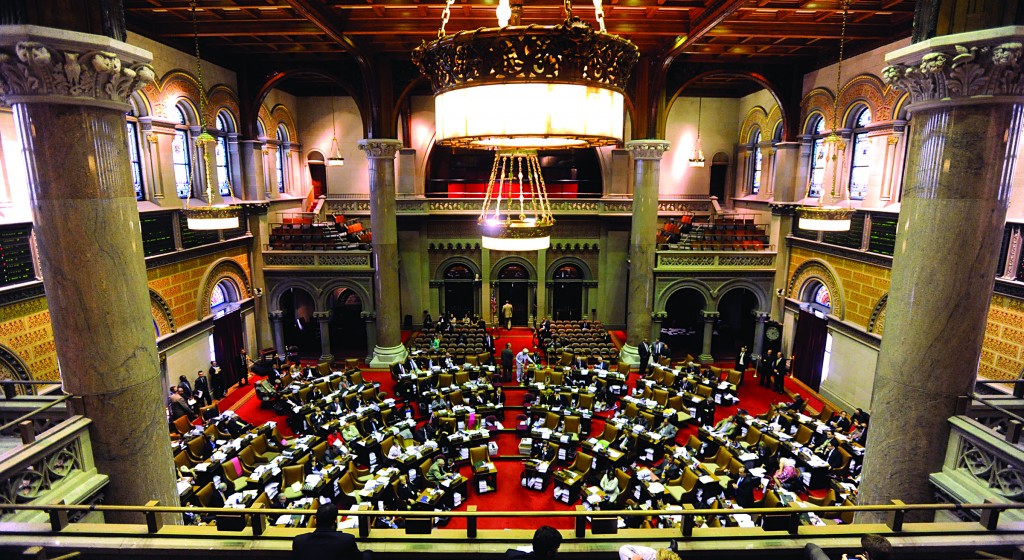Albany’s Annual Scramble Yields a Bill Lode

The final hours of the legislative session in Albany passed, as usual, with a frenzy of bills passing and furious lobbying for pet causes and important pieces of legislation.
Gov. Andrew Cuomo and Assembly Speaker Sheldon Silver, both Democrats, and Senate Majority Leader Dean Skelos, a Republican, pushed for their priorities, horse-traded through the night, and emerged with something for everyone.
Here are some of the laws that passed:
- Four casinos will be built in the regions around Albany, Binghamton and the Catskills-Hudson Valley area. Two casinos could be located in one region, and that would likely be in the Catskills. This has made Jewish bungalow colonies and camps nervous, since it would be located near Ellenville and Monticello, the heart of the area where tens of thousands of Orthodox Jews go each summer.
The bill takes effect only if voters in a fall referendum agree. But gambling through video slot machine centers would begin even if voters reject big casinos.
A report said gambling interests have spent nearly $20 million over two years on campaign contributions and lobbying in Albany, including $242,000 in political contributions to Cuomo and about $400,000 each to the campaigns of the Senate and Assembly majorities.
- The most controversial part of a 10-point bill pushed by Cuomo and liberal women’s groups failed after the Assembly passed it but the Senate didn’t. Senate Republicans defeated a surprise amendment that would have forced the chamber to consider the entire bill, including the one strengthening Roe v. Wade, as one. The Senate passed the nine other bills in the act.
Silver said he will discuss a way forward with the governor, and could bring the issue up again in a special session. Cuomo, who made this a centerpiece of his State of the State address in January, and the women’s coalition of 850 groups that he assembled have insisted for six months that they would accept nothing less than all 10 provisions.
- New York City is allowed to set up 20 to 40 “speed cameras” in school zones to deter speeders.
- Manufacturers are required to collect and safely dispose of mercury-containing thermostats, a law pushed by environmental and health groups since 2010.
Mercury is a highly potent neurotoxin that is extremely harmful to expectant women and children. A state law in 2005 phased out the sale of many mercury-containing products and banned their disposal in solid-waste facilities. But as many as 310,000 discarded mercury products still end up in the waste- stream annually, and only about 3,500 of them are collected under voluntary recycling programs.
- The state increased oversight of special education programs for preschoolers with disabilities, with the comptroller auditing all of the independently run programs at least once in the next five years.
Sponsors say limited audits have shown widespread fraud and abuse among the more than 300 special education providers, including absentee directors, redundant costs and potential conflicts of interest where evaluators direct children into their own programs.
Comptroller Thomas DiNapoli says fraud in the $1.3 billion program has cost taxpayers millions of dollars while depriving children of needed help.
- The embattled Long Island Power Authority will be shrunk and daily operations will be turned over to Public Service Electric & Gas Co. next year. Cuomo has called for the changes in part because of long power outages on Long Island after Superstorm Sandy.
LIPA has been contracting with National Grid for daily operations. The legislation will require PSE&G, a New Jersey utility, to prepare and maintain an emergency response plan.
- New York City is allowed to go back to using mechanical voting machines in this year’s primary and runoff elections. City primaries are scheduled for Sept. 10 for mayor, comptroller, public advocate, borough presidents and city council.
To comply with federal law, the state switched in 2010 to optical scanners that read paper ballots. The city will use the new machines but has the option of using the old ones if needed.
- The mayoral runoff primary was shifted from Sept. 24 to Oct. 1 to avoid conflicting with Sukkos.
- The “Religious Garb” bill prohibits workplace discrimination aimed at those choosing to wear attire for religious reasons. This was proposed in response to concerns from religious communities, primarily Orthodox Jews, Sikhs and Muslims.
The bill amends existing civil-rights, executive, and labor laws, and extends protection as long their “attire” or “appearance” does not pose a hazard to that person or the general public.
This article appeared in print on page 1 of edition of Hamodia.
To Read The Full Story
Are you already a subscriber?
Click "Sign In" to log in!

Become a Web Subscriber
Click “Subscribe” below to begin the process of becoming a new subscriber.

Become a Print + Web Subscriber
Click “Subscribe” below to begin the process of becoming a new subscriber.

Renew Print + Web Subscription
Click “Renew Subscription” below to begin the process of renewing your subscription.








